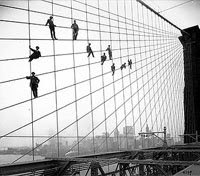If the shoe fits . . .
 Given the fusillade of flying footwear aimed at our departing president in Baghdad, late night comedian Craig Ferguson wonders if a “second thrower” conspiracy theory is taking hold in the blogosphere. Plenty of bad jokes on those shoe missiles are filling the news, late night TV and circulating on the Internet.
Given the fusillade of flying footwear aimed at our departing president in Baghdad, late night comedian Craig Ferguson wonders if a “second thrower” conspiracy theory is taking hold in the blogosphere. Plenty of bad jokes on those shoe missiles are filling the news, late night TV and circulating on the Internet.You’ve heard more than a few by now. Do they make you feel better?
It’s all gallows humor. It’s Shakespeare’s Romeo attempting, unsuccessfully, to ease his dying friend’s pain. Mercutio knows better:
Romeo: "Courage, man; the hurt cannot be much."
Mercutio: "No, 'tis not so deep as a well, nor so wide as a church-door; but 'tis enough, 'twill serve: ask for me tomorrow, and you shall find me a grave man."
Because Americans are afflicted with Attention Deficit Disorder, we often miss the significance of events that swell beneath the surface. Bush adeptly ducks the shoes; we efficiently bob and weave our way to the next bizarre 30-second YouTube clip.
This all allows us to report to ourselves with escapist self-satisfaction: Well, didn’t I handle that with aplomb and a minimum of personal intellectual and emotional cost.
Back up a little and really think about what this celebrity of the moment, Iraqi journalist Muntather Zaidi, yelled out as he threw the first of his clodhoppers:
“This is a gift from the Iraqis; this is the farewell kiss, you dog!”
A few seconds later, Zaidi let fly with his other shoe, shouting:
“This is from the widows, the orphans and those who were killed in Iraq!”
Widows and orphans. Almost a dismissed cliche in American political oratory. The phrase means plenty in Iraq.
Here’s the estimated number of Iraqi deaths due to the U. S. led invasion of Iraq: 1,297,997.
The number is shocking and sobering. It’s based on studies published in the prestigious British medical journal, “The Lancet,” in 2006 and a British polling agency in September 2007, Opinion Research Business.
If you’re skeptical of this number, knock off a 100,000, or 200,000. Or cut it in half. Or slice it back to any number that manages to make you feel comfortable.
How low would your estimate go? How many widows and orphans would emerge from your figure? How many shoes would you feel like throwing if these deaths had happened to your family, in the neighborhoods of your home country? How long would you remember Muntather Zaidi’s flying shoes? How long would you remember his words and repeat them: “this is the farewell kiss, you dog!” And would you ever be able to get those widows, those orphans, out of your mind?
[from Terre Haute Tribune Star “Reader’s Forum," Dec. 28, 2008]



